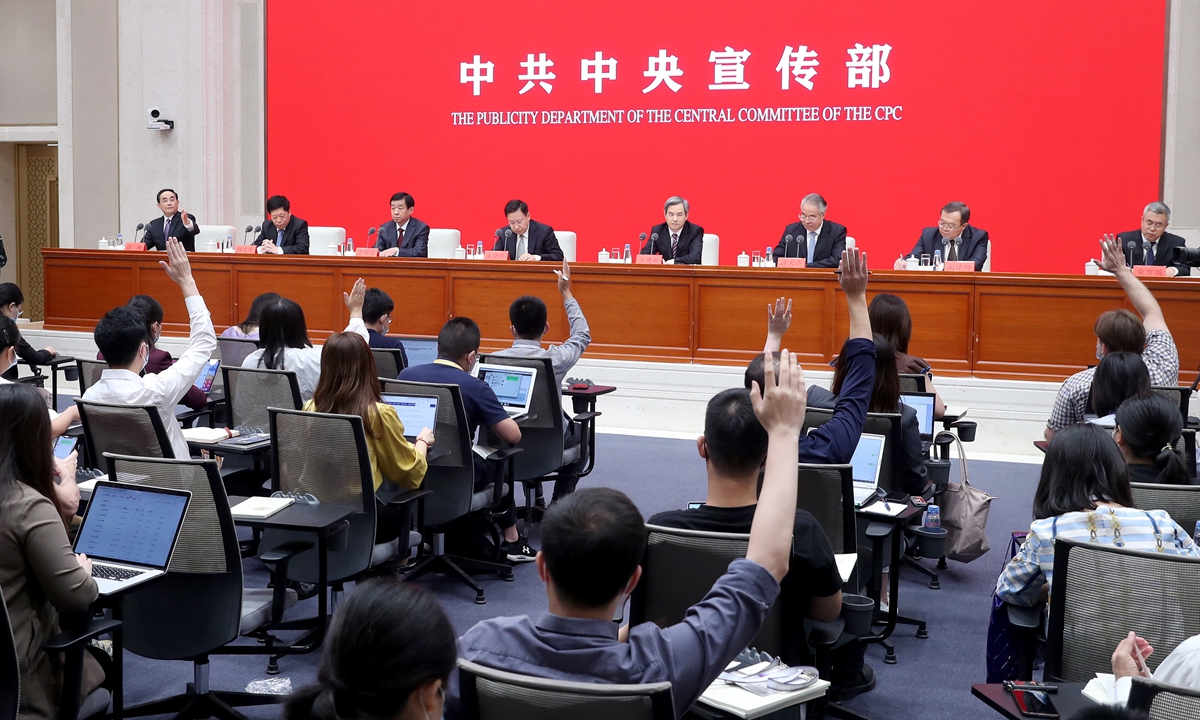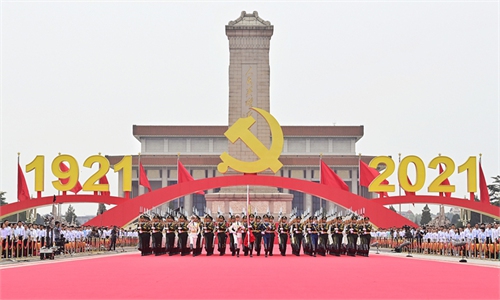China never interferes, exports ideology, development model: official
US confidence in 'democratic system' shaken by own flaws

Officials and journalists attend a press conference in Beijing on Thursday on the release of a key publication titled "The CPC: Its Mission and Contributions." Photo: cnsphoto
Chinese officials and scholars pointed out that the US confidence with its "democratic system" has been shaken by the sharp contrast between China's burgeoning development, with the US bungling of domestic and international affairs. Embarrassed Washington began to hype the Chinese model as the biggest threat to Western-style democracy, and that China exports its values to other countries.
Yet those Chinese officials and observers noted the world has a clear view of who is dictating other countries' destinies, who is threatening other countries, decoupling and imposing sanctions on them…and that international society will compare the performance between China and the US systems, and will choose to learn from the better one.
In response to a question at a press conference on the release of a key publication titled "The CPC: Its Mission and Contributions," Liu Jianchao, deputy director of the Office of the CPC Central Committee Foreign Affairs Commission, lashed out at the US for having no clue of what true democracy is.
There should not be only one model of democracy in the world; it is against the principle of democracy for a country to impose its own democratic model on other countries, said Liu, adding that it is up to the country itself, and its people to make a choice.
Liu's remarks were in response to a question that some politicians in the US said China-US relations have become a competition between "democracy and autocracy," and that the governing ideas of the CPC pose the biggest challenge to Western democracy. They also accused China of intending to export its ideology and values to other countries.
China has never interfered in the internal affairs of other countries, nor exported its ideology or social system, and it supports countries to choose their own development path, said Liu.
Liu asked if the US lacks confidence in its "democracy" or maybe it has seen its flaws, which have been noticed by people around the world. "What is there for the US to worry about if its democratic system is good and supported by all people?''
Li Haidong, professor at the Institute of International Relations at the China Foreign Affairs University, told the Global Times that in handling some hot spot issues recently, the US has exposed many problems of its system.
Li said that the hasty pullout from Afghanistan is a complete mess, and the poor handling of the COVID-19 epidemic situation is a tragedy, and the rest of the world will compare the performance between China and the US' systems and will choose to learn from the better one.
"The idea and governance system of China which has proven to be more effective in handling crises will be learned by more countries, and for the elites of the US and some Western countries, this situation is embarrassing, painful and unacceptable," Li noted.
In March, not long after US President Joe Biden took office, he defined his underlying challenge with China as "a battle between the utility of democracies in the 21th century and autocracies," and that "We've got to prove democracy works."
Then in June, during his first foreign visit as president, he attempted to pull European allies closer to confront China over infrastructure, technology, ideology and other fronts.
Diao Daming, an expert on US studies and associate professor at the Renmin University of China in Beijing, said that what the US and some Western countries are doing to stigmatize China is like "a sick person who forces others to take medicine for his own illness."
A consequence of such self-deceiving approaches would be horrible, because they (the US and some Western countries) can't honestly face their own problems, but try to pass the buck, to hype and exaggerate external threats, and smear other countries, Diao said, stressing that "without a correct understanding of their own problems, they won't be able to have effective self-rectification."
Another serious consequence would be disrupting the international order, and damaging the stability of relations between major powers worldwide, said Chinese experts.
"The prosperity and stability of the world will be difficult to sustain and the US and its Western allies will also find the external environment for them to reform and to correct mistakes increasingly harsh. In general, the approach to stigmatize China or the CPC will not help the US and the West get better, and won't stop China's development. The US and some of its Western allies will find they are actually hurting themselves," Diao noted.
Liu also responded to a question about Western countries' claim that China intends to challenge current "rules-based international order" put forward by certain Western countries.
He pointed out that the "international order" made by some Western countries is based on military alliances, and guided by ideology, which serves only to maintain the dominant status of a few countries, while excluding many developing countries from the global governance system.
The slew of propositions China made in the international arena, including the Belt and Road Initiative, are to let countries conduct economic cooperation based on freedom, mutual benefit and win-win principles, which is widely welcomed by the international society.
On the contrary, who is dictating other countries' destinies, who is forming small cliques to exclude countries that do not agree with it? Who is threatening other countries, decoupling and imposing sanctions on them? Who is pushing the world to antagonism? "I think people around the world can see the truth very clearly," Liu said.

